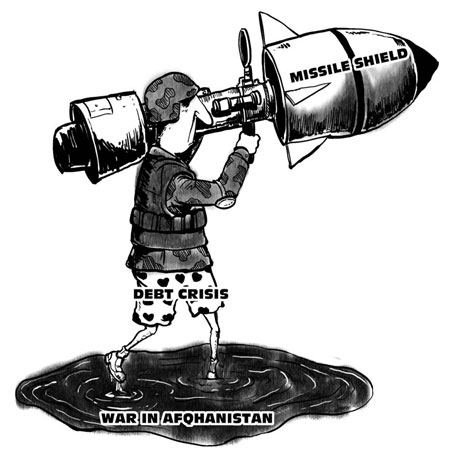NATO's eastward expansion
Updated: 2012-05-21 08:07
By Li Hong (China Daily)
|
||||||||

The biggest-ever NATO summit opened in Chicago on Sunday and brought representatives of around 60 countries and international organizations together to discuss Afghanistan, future capabilities and strengthening of its cooperation with non-members.
"This will be a summit of commitment. Commitment to complete transition in Afghanistan and to support Afghans achieving a stable future. Commitment to keep NATO capable to deal with the challenges of the 21st century. Commitment to strengthen even further the connections with our partners across the globe," NATO Secretary-General Anders Fogh Rasmussen said at a news conference in Brussels on May 11.
Afghanistan has been an important experiment for NATO's military intervention into a non-European region, but it remains a troublesome issue, given that participating countries have been longing to pull out of the Afghanistan quagmire as early as possible.
Since the Republic of Korea withdrew its military personnel, who were offering logistical support to US troops in 2007, following the abduction of some of its nationals, NATO members increasingly asked for their troops to be withdrawn.
In August 2010, the Netherlands withdrew troops from Afghanistan, making it the first NATO member to do so. Under increased pressure, at its summit in Lisbon in November that year, NATO agreed to withdraw the majority of combat forces at the end of 2014 and transfer security responsibilities to Afghan security forces.
However, how to promote a steady security transition and consolidate its military achievements in the ravaged nation still remains a problem for NATO. How to ensure an orderly troop withdrawal without causing turbulence and how to help Afghan security forces improve their capabilities, a task that needs large inputs of funds and personnel, poses a huge challenge to NATO.
At the Chicago summit, NATO members are expected to make arrangements for the final-stages of the transition and their future missions in Afghanistan. They are also expected to debate on how much member countries will contribute to the $4 billion needed to aid Afghan security forces and police.
NATO's future military capabilities are also expected to be on agenda. It is the belief of France, Germany and other traditional European nations that Europe now faces no pressing security threats and thus they hold a passive attitude toward the alliance's expansion and build-up of military capabilities. Germany, the Netherlands and Belgium have even called for a review of the role of nuclear weapons in Europe's security and demanded the US remove its nuclear arsenals from the continent. As far as the missile system is concerned, some European allies also advocate dialogue with Russia to avoid confrontation with Moscow.
Meanwhile, China's rapid development, Russia's ties with the West under Vladimir Putin's new presidency, the alleged nuclear build-up by the Democratic People's Republic of Korea as well as uncertainties in the Middle East, including Iran's nuclear program, are seen as constituting an increased security challenge to the US and NATO.
To tackle such challenges, the US, financially exhausted after its decade-long war on terror, has increased the pressure on its European allies to increase military inputs and share more responsibilities. A decade-long anti-terror war has seriously exhausted the US. However, in the context of the deteriorating debt crisis in Europe, European leaders are unlikely to make some of the commitments that are necessary to build-up NATO's military capabilities for the future.
Despite its original concept of focusing on European and Atlantic affairs, NATO has unveiled its plans to develop itself into a political and military alliance engaging in global affairs. It is expected NATO leaders will sum up their lessons in the Afghanistan war and military interventions in Libya to make better preparations for NATO involvement into non-European affairs.
NATO succeeded in including some East European countries into its scope of influence through the "Partnership for Peace". And in Afghanistan, it realized cooperation with the ROK, Japan, Australia, New Zealand and other quasi-allies. New headway has also been made in its cooperation with Russia, Pakistan and some Central Asian countries. That some Asian countries were invited to the Chicago summit reflects NATO's plan to set up some strategic strongholds in the Asia-Pacific region.
NATO's ongoing transformation has also offered the possibility for cooperation with China, which has expressed its willingness to have some cooperation with NATO on the basis of "mutual trust, mutual benefit, equality and coordination".
In fact, both sides have conducted dialogue and contacts in political and diplomatic fields, as indicated by bilateral anti-piracy cooperation in the Gulf of Aden. There is also room for non-proliferation and anti-terrorism cooperation.
However, the huge differences between China and NATO in ideology and values, as well as China's non-alignment policy mean no essential progress will be achieved in bilateral cooperation. China needs to remain highly vigilant of NATO's development of an anti-missile defense system in Asia and its militarization of space.
The author is secretary-general of the China Arms Control and Disarmament Association.

 Relief reaches isolated village
Relief reaches isolated village
 Rainfall poses new threats to quake-hit region
Rainfall poses new threats to quake-hit region
 Funerals begin for Boston bombing victims
Funerals begin for Boston bombing victims
 Quake takeaway from China's Air Force
Quake takeaway from China's Air Force
 Obama celebrates young inventors at science fair
Obama celebrates young inventors at science fair
 Earth Day marked around the world
Earth Day marked around the world
 Volunteer team helping students find sense of normalcy
Volunteer team helping students find sense of normalcy
 Ethnic groups quick to join rescue efforts
Ethnic groups quick to join rescue efforts
Most Viewed
Editor's Picks

|

|

|

|

|

|
Today's Top News
Health new priority for quake zone
Xi meets US top military officer
Japan's boats driven out of Diaoyu
China mulls online shopping legislation
Bird flu death toll rises to 22
Putin appoints new ambassador to China
Japanese ships blocked from Diaoyu Islands
Inspired by Guan, more Chinese pick up golf
US Weekly

|

|






